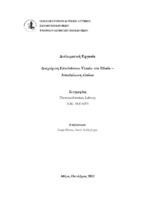| dc.contributor.advisor | Πέππα, Σοφία | |
| dc.contributor.author | Παναγιωτόπουλος, Ιωάννης | |
| dc.date.accessioned | 2022-11-23T09:28:33Z | |
| dc.date.available | 2022-11-23T09:28:33Z | |
| dc.date.issued | 2022-11-21 | |
| dc.identifier.uri | https://polynoe.lib.uniwa.gr/xmlui/handle/11400/3398 | |
| dc.identifier.uri | http://dx.doi.org/10.26265/polynoe-3238 | |
| dc.description.abstract | Στην παρούσα διπλωματική εργασία εξετάζεται το κανονιστικό πλαίσιο για τα επικίνδυνα υλικά των πλοίων και τις μεθόδους απόρριψής τους κατά την ανακύκλωση των πλοίων. Δεδομένων των περιβαλλοντικών κινδύνων και προκλήσεων που μαστίζουν τη σύγχρονη κοινωνία, όπως η περιβαλλοντική ρύπανση και η κλιματική αλλαγή, η διεθνής ναυτιλιακή κοινότητα έχει εντείνει τις προσπάθειές της για τον έλεγχο της διασυνοριακής διακίνησης επικίνδυνων αποβλήτων θεσπίζοντας τη σχετική νομοθεσία. Στο πλαίσιο αυτό, το Πρόγραμμα για το Περιβάλλον των Ηνωμένων Εθνών υιοθέτησε τη Σύμβαση της Βασιλείας, η οποία, μαζί με τη Διεθνή Σύμβαση του Χονγκ Κονγκ, έθεσαν απαιτήσεις που καλύπτουν ολόκληρο τον κύκλο ζωής του πλοίου, με ιδιαίτερη έμφαση στη διάλυση και την ανακύκλωσή του. Επιπλέον η Ευρωπαϊκή Ένωση υιοθέτησε τον Κανονισμό (ΕΕ) αριθμ. 1257/2013 για την ανακύκλωση των πλοίων, ο οποίος πρόσφατα συμπεριέλαβε δύο επιπλέον επικίνδυνα υλικά το υπερφθορο-οκτανοθειικό οξύ (PFOS) και το εξαβρωμοκυκλοδωδεκάνιο (HBCDD). Στην εργασία αναλύεται λεπτομερώς αυτό το κανονιστικό πλαίσιο. Επιπρόσθετα, εξετάζονται τα επικίνδυνα υλικά που εντοπίστηκαν κατά τις επιτόπιες έρευνες που πραγματοποιήθηκαν σε διάφορους τύπους πλοίων και εξήχθησαν συμπεράσματα σχετικά με τις θέσεις του πλοίου και τα αντικείμενα/εξοπλισμό που είναι πιο πιθανό να περιέχουν επικίνδυνα υλικά. | el |
| dc.format.extent | 111 | el |
| dc.language.iso | el | el |
| dc.publisher | Πανεπιστήμιο Δυτικής Αττικής | el |
| dc.rights | Αναφορά Δημιουργού - Μη Εμπορική Χρήση - Παρόμοια Διανομή 4.0 Διεθνές | * |
| dc.rights | Attribution-NonCommercial-NoDerivatives 4.0 Διεθνές | * |
| dc.rights.uri | http://creativecommons.org/licenses/by-nc-nd/4.0/ | * |
| dc.subject | Επικίνδυνα υλικά | el |
| dc.subject | Πράσινη ναυτιλία | el |
| dc.subject | Συνθήκη της Βασιλείας | el |
| dc.subject | Σύμβαση του Χονγκ Κονγκ | el |
| dc.subject | Ευρωπαϊκός κανονισμός 1257/2013 | el |
| dc.subject | Κανονισμός για την ανακύκλωση πλοίου | el |
| dc.title | Διαχείριση επικίνδυνων υλικών στα πλοία – Ανακύκλωση πλοίων | el |
| dc.title.alternative | Management οf hazardous materials onboard ships – Ship recycling | el |
| dc.type | Διπλωματική εργασία | el |
| dc.contributor.committee | Pagonis, Dimitris Nikos | |
| dc.contributor.committee | Ιακωβίδης, Ισίδωρος | |
| dc.contributor.faculty | Σχολή Μηχανικών | el |
| dc.contributor.department | Τμήμα Ναυπηγών Μηχανικών | el |
| dc.description.abstracttranslated | This thesis focuses on the regulatory framework for hazardous materials on board and their disposal methods during ship recycling. Given the environmental risks and challenges plaguing modern societies, such as environmental pollution and climate change, the international maritime community has stepped up its efforts, to control hazardous waste transboundary movements by the relevant legal framework. In this context, the United Nations Environment Program introduced the Basel Convention which, to be considered in conjunction with the Hong Kong International Convention, provided content covering the entire life cycle of the ship, with particular emphasis on its dismantling and recycling. The European Union went further in regulatory terms and approved the European Regulation 1257/2013, which recently added two additional requirements for Perfluorooctane Sulfonic acid (PFOS) and hexabromocyclododecane (HBCDD). This regulatory framework is described in detail in the thesis. Additionally, various hazardous materials identified during on-site surveys carried out in several ship types were examined, and conclusions concerning the most typical locations and item/equipment that typically contain hazardous materials were made. | el |


